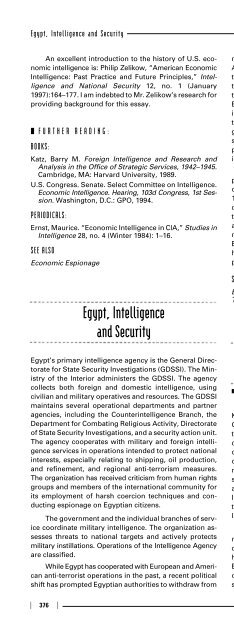ENCYCLOPEDIA OF Espionage, Intelligence, and Security Volume ...
ENCYCLOPEDIA OF Espionage, Intelligence, and Security Volume ...
ENCYCLOPEDIA OF Espionage, Intelligence, and Security Volume ...
Create successful ePaper yourself
Turn your PDF publications into a flip-book with our unique Google optimized e-Paper software.
Egypt, <strong>Intelligence</strong> <strong>and</strong> <strong>Security</strong>An excellent introduction to the history of U.S. economicintelligence is: Philip Zelikow, “American Economic<strong>Intelligence</strong>: Past Practice <strong>and</strong> Future Principles,” <strong>Intelligence</strong><strong>and</strong> National <strong>Security</strong> 12, no. 1 (January1997):164–177. I am indebted to Mr. Zelikow’s research forproviding background for this essay.❚ FURTHER READING:BOOKS:Katz, Barry M. Foreign <strong>Intelligence</strong> <strong>and</strong> Research <strong>and</strong>Analysis in the Office of Strategic Services, 1942–1945.Cambridge, MA: Harvard University, 1989.U.S. Congress. Senate. Select Committee on <strong>Intelligence</strong>.Economic <strong>Intelligence</strong>. Hearing, 103d Congress, 1st Session.Washington, D.C.: GPO, 1994.PERIODICALS:Ernst, Maurice. “Economic <strong>Intelligence</strong> in CIA,” Studies in<strong>Intelligence</strong> 28, no. 4 (Winter 1984): 1–16.SEE ALSOEconomic <strong>Espionage</strong>Egypt, <strong>Intelligence</strong><strong>and</strong> <strong>Security</strong>Egypt’s primary intelligence agency is the General Directoratefor State <strong>Security</strong> Investigations (GDSSI). The Ministryof the Interior administers the GDSSI. The agencycollects both foreign <strong>and</strong> domestic intelligence, usingcivilian <strong>and</strong> military operatives <strong>and</strong> resources. The GDSSImaintains several operational departments <strong>and</strong> partneragencies, including the Counterintelligence Branch, theDepartment for Combating Religious Activity, Directorateof State <strong>Security</strong> Investigations, <strong>and</strong> a security action unit.The agency cooperates with military <strong>and</strong> foreign intelligenceservices in operations intended to protect nationalinterests, especially relating to shipping, oil production,<strong>and</strong> refinement, <strong>and</strong> regional anti-terrorism measures.The organization has received criticism from human rightsgroups <strong>and</strong> members of the international community forits employment of harsh coercion techniques <strong>and</strong> conductingespionage on Egyptian citizens.The government <strong>and</strong> the individual branches of servicecoordinate military intelligence. The organization assessesthreats to national targets <strong>and</strong> actively protectsmilitary instillations. Operations of the <strong>Intelligence</strong> Agencyare classified.While Egypt has cooperated with European <strong>and</strong> Americananti-terrorist operations in the past, a recent politicalshift has prompted Egyptian authorities to withdraw frommany Western intelligence <strong>and</strong> security efforts in NorthAfrica <strong>and</strong> the Middle East. The rise of Islamist sects <strong>and</strong>terrorist groups in the region, as well as Egypt’s close tiesto neighboring Arab states, creates further diplomatictensions with Europe <strong>and</strong> the United States. AlthoughEgyptian intelligence agencies aided the United Statesintelligence community by providing information aboutthe Al-Qaeda terrorist network, many in the Egyptiangovernment opposed the United States led war in Afghanistanin 2001. Regardless, Egypt continues a liberal-usepolicy of its territorial waters for international shipping,including access to the Suez Canal.The Egyptian Constitution prohibits religious politicalparties, but over the past decade, a few Islamist militantorganizations have gained some political ground. In the1990s, Egyptian <strong>and</strong> United States intelligence forces conductedoperations to locate <strong>and</strong> capture Egyptian militantswho had fled the country <strong>and</strong> were basing possibleanti-government <strong>and</strong> terrorist operations abroad. The twonations successfully captured several suspects, but theEgyptian government garnered international criticism forhuman rights abuses, including poor treatment of theprisoners <strong>and</strong> the use of secretive military tribunals.SEE ALSOEnduring Freedom, OperationTerrorism, <strong>Intelligence</strong> Based Threat <strong>and</strong> Risk AssessmentsEichmann, Adolf:Israeli Capture❚ ADRIENNE WILMOTH LERNERKarl Adolf Eichmann (1906–1962) was the head of theGerman Gestapo Department of Jewish Affairs from 1941to 1945. During World War II, Eichmann oversaw thedeportation of European Jews to ghettos. In 1942, heorganized the Wansee Conference, a meeting of Naziofficials to devise the “Final Solution,” the Nazi euphemismfor the extermination of European Jews. Eichmannsupervised the creation <strong>and</strong> operation of death camps,<strong>and</strong> set Nazi policy on the seizure of Jewish property.Immediately following the war, he was identified as one ofthe primary Nazi war criminals sought by internationallaw enforcement <strong>and</strong> intelligence agencies.After his arrest <strong>and</strong> escape from an American internmentcamp in 1946, Eichmann assumed a variety of pseudonyms<strong>and</strong> moved throughout Europe, never contactinghis family. British <strong>and</strong> American intelligence searched forEichmann for a few months, but as the Nuremberg Trialsof other Nazi war criminals began, the focus of attentionshifted from Eichmann <strong>and</strong> other escapees. The onset of376 Encyclopedia of <strong>Espionage</strong>, <strong>Intelligence</strong>, <strong>and</strong> <strong>Security</strong>







![The Big Lie 9-11 and Government Complicity in Mass Murder [PDF]](https://img.yumpu.com/50957077/1/190x245/the-big-lie-9-11-and-government-complicity-in-mass-murder-pdf.jpg?quality=85)








